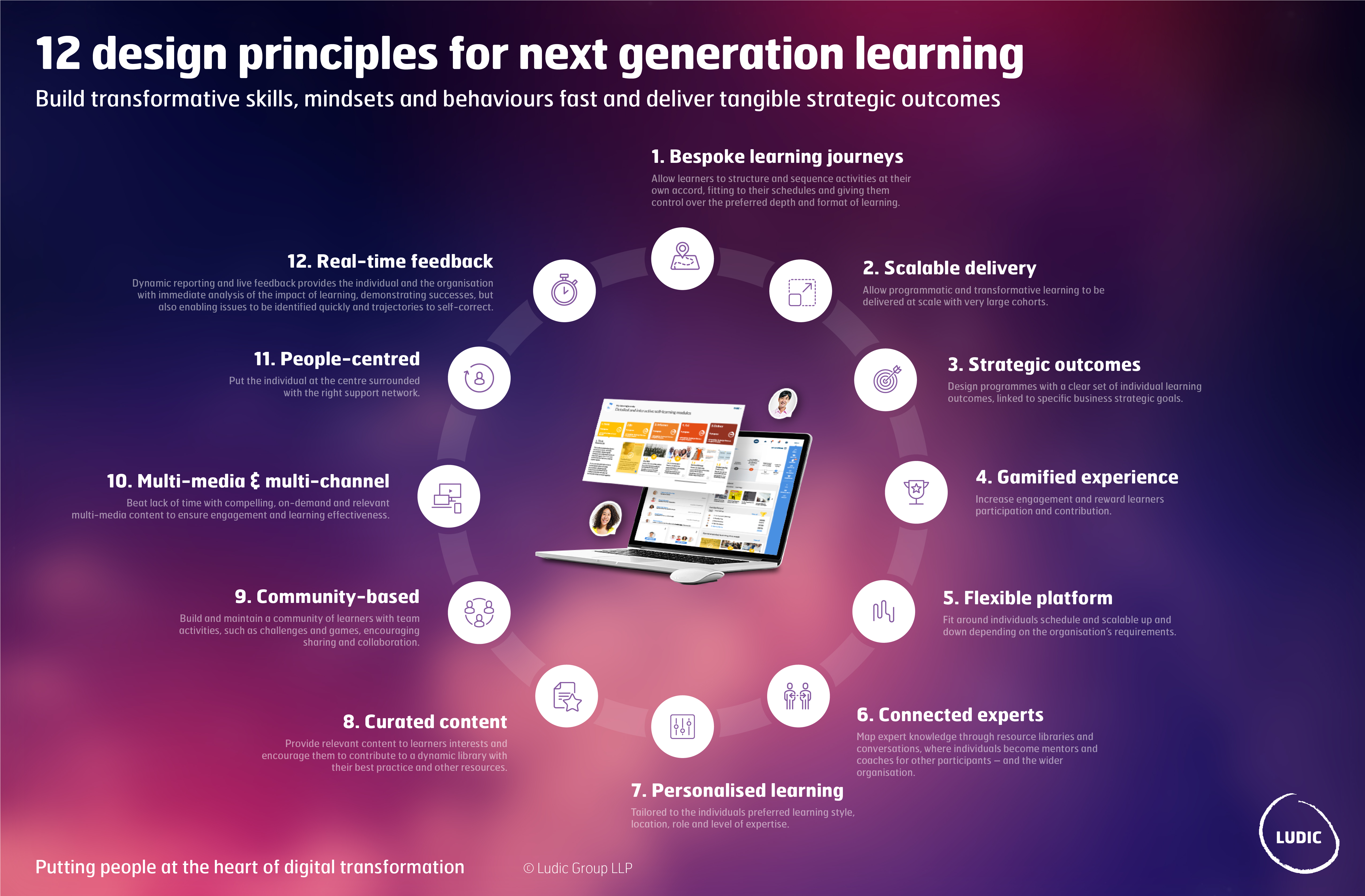
Deliver personalised learning experiences at scale, with transformative results.
The concept of next generation learning has captured the attention of both the Board and learning professionals. When executed well, it can enable organisations to build vital transformative skills, mindsets and behaviours, faster and more cost effectively than ever before. By using digital resources to optimise adult learning, organisations can significantly speed up the cycle of building capable people, giving them the competitive advantage against others.
We have defined 12 principles that can be used as a blueprint to design next generation learning programmes that deliver tangible strategic outcomes. All elements have human-centric and technological implications when designing transformative learning programmes at scale.
Bespoke learning journeys – a combination of self-learning, virtual and face-to-face classrooms, one-to-one (virtual) coaching, and structured team and peer learning activities results in the best adult learning programme. The mix allows learners to structure and sequence activities at their own accord, fitting to their schedules and giving them control over the preferred depth and format of learning.
Scalable delivery – this allows programmatic and transformative learning to be delivered at scale with very large cohorts. The technology platform creates peer communities and learning teams, automates the booking of classrooms and coaching sessions, and keeps participants on track through notifications and reminders. It is also incredibly cost efficient as it applies expert resource as and when needed, using a very lean core delivery team.
Strategic outcomes – programmes are designed with a clear set of learning outcomes for the individual, closely linked to specific strategic goals of the business. This could mean the organisation defining what good business partnering means for them, if this is the strategy, then translating this to a set of required competencies and skills.
Gamified experience – games, fun and competition are at the heart of this theory. Gamification allows learners to test ideas in safe scenarios, but more importantly, it rewards participation and contribution within an engaging environment.
Flexible platform – all programmes are designed with flexibility at the heart, for the individual and the organisation alike. For individuals, timescale, activities and modes of learning fit around their schedules. For organisations, the programme can be scaled up and down depending on requirements.
Connected experts – expertise often already exists in organisations, it’s about accessing this expertise. This theory maps expert knowledge through resource libraries and conversations, where these individuals become mentors and coaches for other participants – and the wider organisation
Personalised learning – highly personalised programmes maximise limited time for training. It is created for each individual based on what they choose to access or attend. Learning teams are then formed and personal development coaches are recommended automatically based on individuals location, role and level of expertise.
Curated content – high level content is often readily available within organisations, just like expertise. The challenge is curating the content and providing the most relevant parts to learners. The recipe for success is providing enough useful tools, concepts and examples around a topic to then encourage participants to contribute and share their own best practice and other resources. Participants very rapidly add their own materials, building a dynamic library of curated content for themselves, with popular resources bubbling up.
Community-based – it is a fact that we learn better alongside peers. Next generation learning builds and maintains a community of learners with team activities, such as challenges and games, encouraging sharing and collaboration.
Multi-media and multi-channel – people have limited time, so content needs to be compelling, on-demand and relevant. By providing a range of media, such as film, games, quizzes and animation, engagement is increased and so is the effectiveness of learning. It also flexes to peoples’ lives – learners could watch a video tutorial on the way to work on their phone, then participate in a virtual classroom from their desktop.
People-centred – research has demonstrated that individuals excel when surrounded by the right support network. This type of learning puts the individual at the centre and supports them closely, linking with their line manager, personal coach and others. This dynamic motivates and encourages people, ensuring learners get the most from their experience.
Real-time feedback – effective learning needs rapid and real-time feedback. To achieve this, dynamic reporting and live feedback provides the individual and the organisation with immediate analysis of the impact of learning. Not only does this demonstrate successes, but also enables issues to be identified quickly and trajectories to self-correct.
With these principles, next generation learning provides the solution to scaling up learning in a cost-effective manner. By following this theory, organisations can create world-class learning programmes that will deliver personalised experiences at scale, with transformative results.
As published on the HR News.



